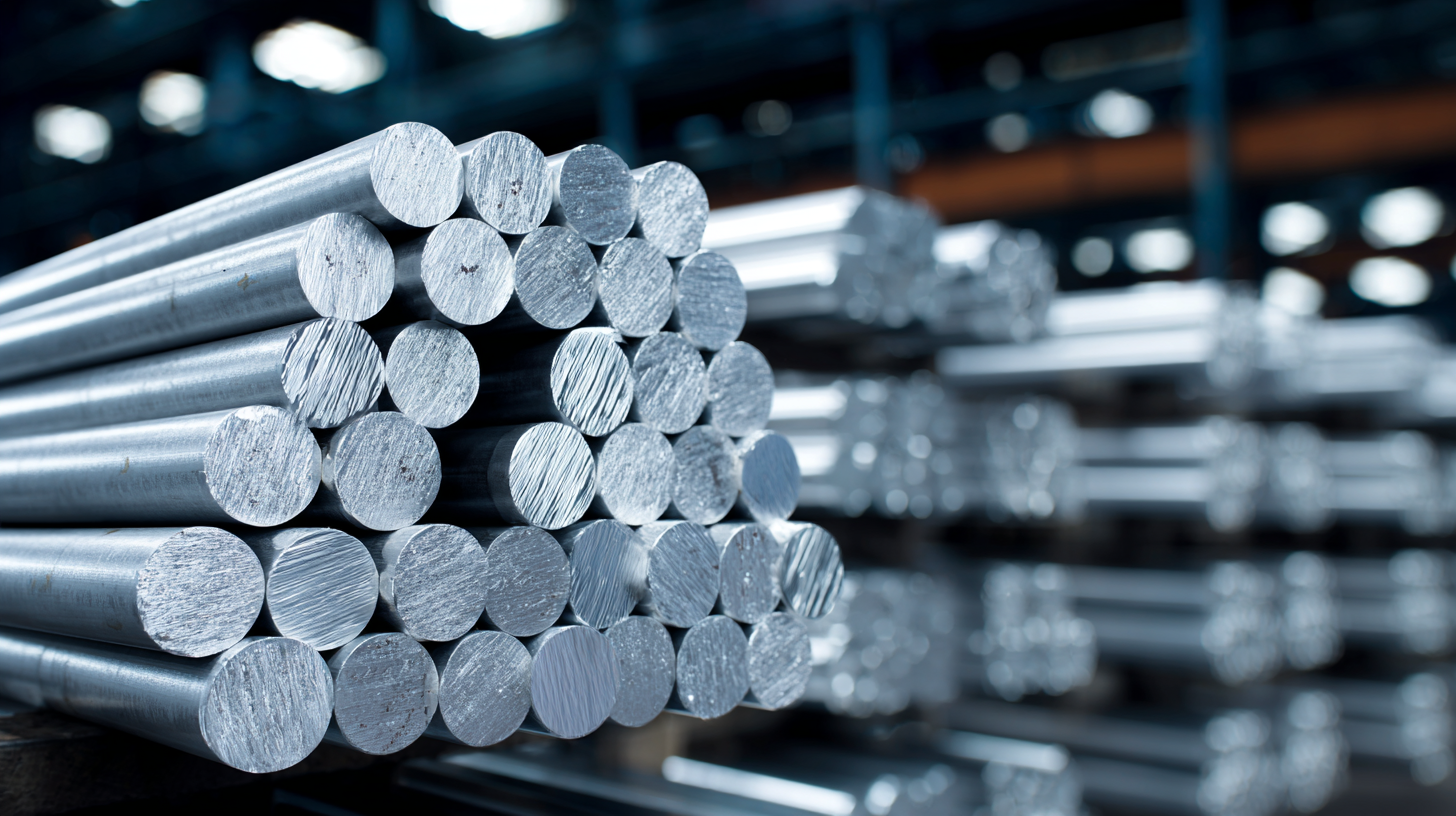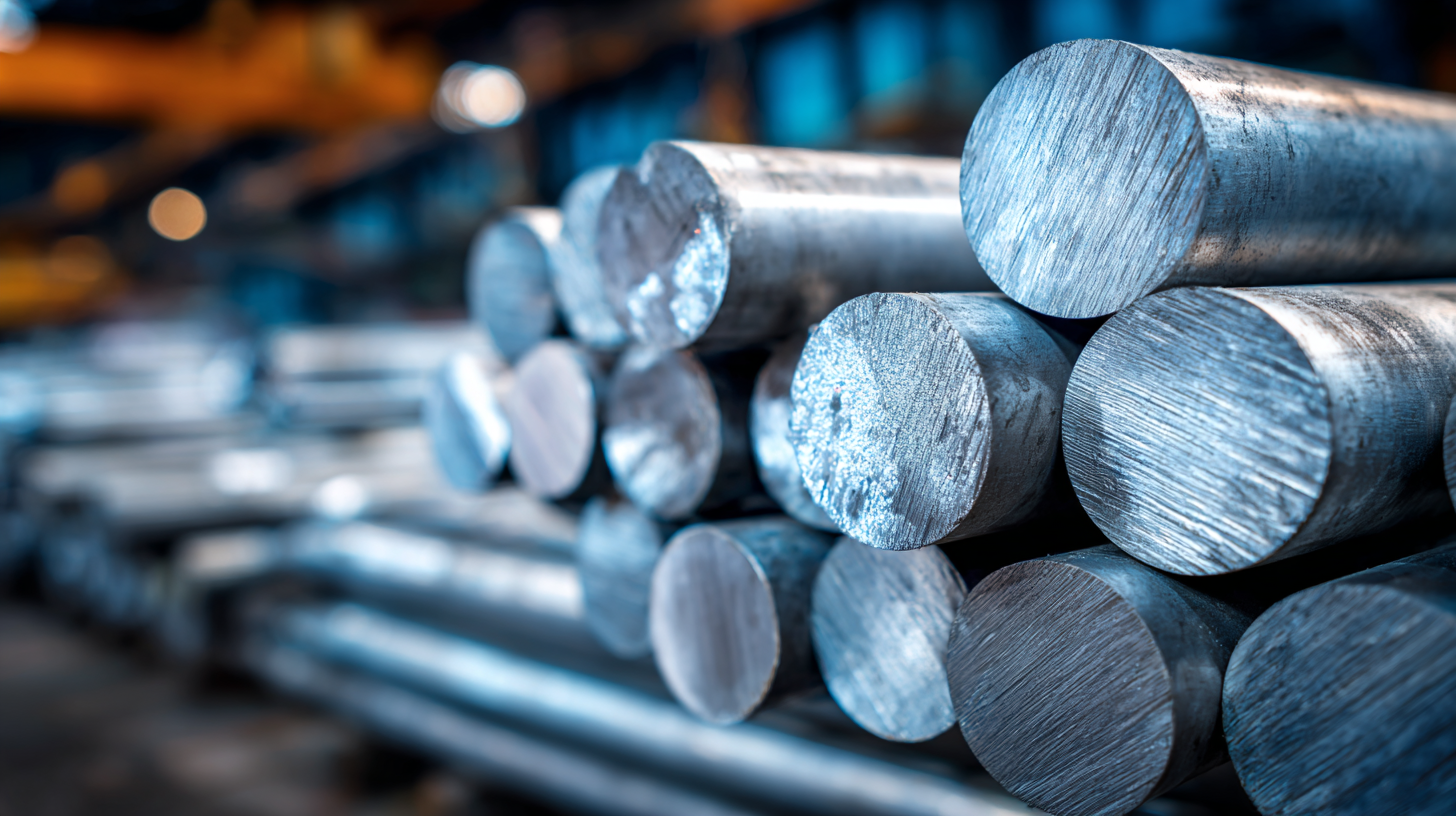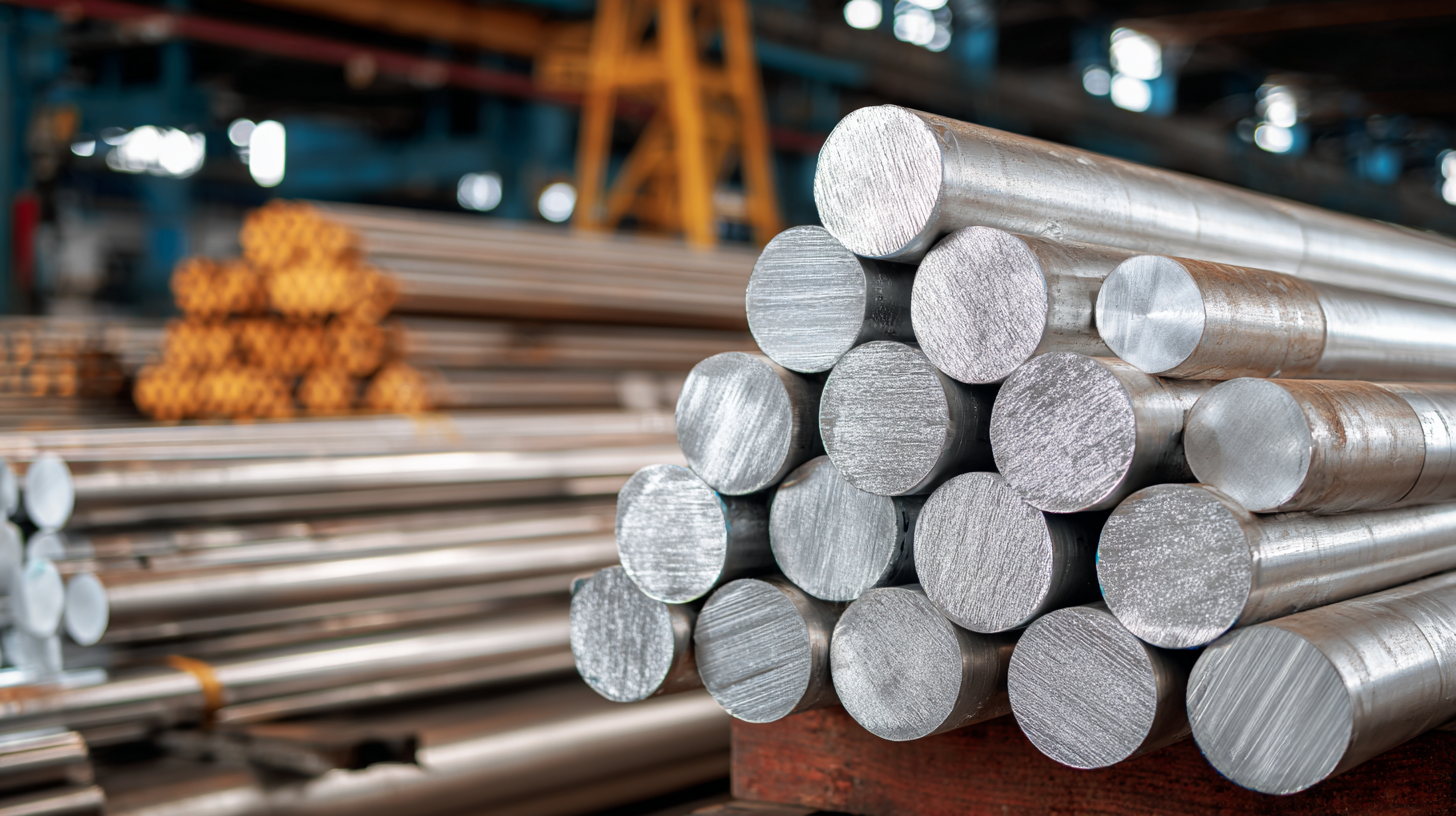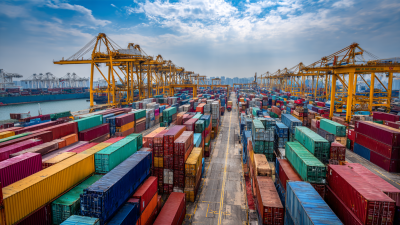Top Strategies for Sourcing Affordable 6061 T6 Aluminum in the Global Market
Table of Contents
- Identifying Key Global Suppliers for 6061 T6 Aluminum
- Navigating Variances in Pricing across Different Markets
- Evaluating Quality Standards and Certifications for Aluminum
- Leveraging Technology for Efficient Sourcing Processes
- Building Long-term Relationships with Suppliers to Ensure Reliability
- Understanding Market Trends Impacting Aluminum Pricing and Availability
- FAQS
- Related Posts
These days, with so much competition out there, finding affordable 6061 T6 aluminum is more important than ever for industries like aerospace, shipbuilding, and even aviation. From what I’ve seen in recent market reports, the demand for high-quality aluminum alloys has really taken off. In fact, the global aluminum market is expected to hit around $300 billion by 2026—that’s quite a huge number!

As part of Shanghai Miandi Metal Group Co., Ltd., which has a pretty solid reputation for distributing all kinds of aluminum—anywhere from the 1000 series to the 8000 series—we totally get how tricky navigating prices and buying strategies can be. The price of 6061 T6 aluminum is a big deal for manufacturers trying to find the sweet spot between cost and quality, so it’s really worth exploring smarter ways to source it.
In this post, I’ll share some of the best strategies for getting this versatile alloy at a fair price, all while making sure the quality stays up to industry standards. Let’s dive in and see how you can make it work for your needs!
Identifying Key Global Suppliers for 6061 T6 Aluminum
So, if you're on the lookout for affordable 6061 T6 aluminum globally, finding the right suppliers is pretty key. Countries like Sri Lanka and Kuwait are really catching attention these days—they're actually seeing some serious growth in the aluminum scene. For example, Sri Lanka’s market for aluminum bars shot up by a whopping 71% in 2024, hitting around $6 million. That’s a big bounce-back after some pretty rough years, which totally paints Sri Lanka as a promising spot for manufacturers hunting for competitively priced aluminum.
And then there's Kuwait—its aluminum bar market grew to about $150 million in 2024, showing a 12% jump from the year before. All this points to suppliers in these regions offering not just good prices, but also solid, reliable supply chains. If you’re exploring these emerging markets, you could snag some great deals, and maybe even strike up partnerships that give you an edge in the global aluminum game. It’s definitely worth keeping an eye on these spots—they could be game-changers for your sourcing strategy.

Navigating Variances in Pricing across Different Markets
When you're on the hunt for affordable 6061 T6 aluminum, it’s pretty important to keep in mind that prices can really vary a lot depending on where you’re looking. Recent stuff I’ve come across shows that costs fluctuate quite a bit across different countries, mainly because of things like tariffs, supply chain hiccups, and local economic policies. The weird thing is, tariffs can throw a wrench in things — making prices jump in some places while creating new chances elsewhere. For example, a 10% import tariff might hike aluminum prices by around 5% in the U.S., which definitely messes with how manufacturers plan their purchases.
Evaluating Quality Standards and Certifications for Aluminum
Looking to find affordable 6061 T6 aluminum somewhere around the world? Well, it's pretty important to really check out the quality standards and certifications—these are key to making sure you get reliable, good-performing stuff. According to a report from the Aluminum Association, over 90% of manufacturers make it a point to source materials that are certified. Usually, these certifications include neat things like ASTM standards, which are basically rules that make sure the aluminum has the right strength, chemical makeup, and tolerances. That way, you lower the chances of any structural issues, whether you're talking about planes or buildings.
Oh, and certifications like ISO 9001? They actually boost a supplier’s credibility quite a bit. There's this study in the Journal of Materials Science that found companies with ISO-certified processes tend to have about 20% fewer defects—and their customers are way happier because of it. That’s a big deal, especially when you're dealing with overseas suppliers where the quality might vary a lot. By insisting on these standards, companies can reduce risks and get top-notch materials that fit their needs, without breaking the bank. It’s all about making smarter choices and keeping things running smoothly.
Leveraging Technology for Efficient Sourcing Processes
In today’s super competitive global scene, using tech tools isn’t just helpful — it’s kind of essential if you're trying to find affordable 6061 T6 aluminum. Thanks to the rise of digital platforms and software, the whole procurement process has become way smoother. These days, businesses can quickly spot reliable suppliers, compare prices across the board, and get a good feel for quality standards without sweating over it. It’s a huge time-saver and helps cut down on resources spent on old-school sourcing methods. Basically, this tech-driven way of working means you can lock in the best deals without breaking a sweat.

And let’s not forget about data analytics — it’s a game changer. Monitoring market trends and price swings becomes so much easier when you’ve got real data at your fingertips. Looking at past info and live market updates alike, companies can make smarter calls about when and where to buy their materials. Plus, automating inventory management helps keep stock levels just right—not overdoing it or running out of essentials. So, bringing tech into your sourcing game doesn’t just boost efficiency; it also helps build better relationships with suppliers, which can lead to better deals and more flexible terms overall.
Building Long-term Relationships with Suppliers to Ensure Reliability
Getting those long-term relationships with suppliers nailed down is super important in the super competitive world of sourcing affordable 6061 T6 aluminum. According to the Aluminum Association, global demand for aluminum is expected to jump by about 3.5% each year, which means businesses really need to build solid, reliable connections with their suppliers. When companies put effort into developing strong partnerships, they often score better prices and more consistent availability — all of which helps cut costs and streamline production.
But, let’s be honest, a good supplier relationship isn’t just about the rough transactions. Research from the Institute for Supply Management shows that companies with close supplier ties tend to face about 20% fewer disruptions in their supply chain. By taking the time to understand what suppliers are going through and what challenges they face, businesses can keep a steady flow of 6061 T6 aluminum coming in. This kind of hands-on approach means they can negotiate better deals and create a situation where everyone wins, even when the market gets a bit unpredictable. Trust and open communication aren’t just nice-to-haves — they’re essential for smoother procurement and making the business as a whole more resilient."
Top Strategies for Sourcing Affordable 6061 T6 Aluminum in the Global Market - Building Long-term Relationships with Suppliers to Ensure Reliability
| Supplier Location | Material Grade | Price per Kg (USD) | Minimum Order Quantity (Kg) | Lead Time (Days) | Relationship Duration (Years) |
|---|---|---|---|---|---|
| China | 6061 T6 | 2.50 | 1000 | 15 | 5 |
| India | 6061 T6 | 2.70 | 500 | 20 | 3 |
| United States | 6061 T6 | 3.00 | 2000 | 10 | 4 |
| Germany | 6061 T6 | 3.50 | 1500 | 12 | 2 |
| Japan | 6061 T6 | 3.20 | 800 | 18 | 3 |
Understanding Market Trends Impacting Aluminum Pricing and Availability
The global aluminum market's been pretty up and down lately, with prices and availability swinging quite a bit. Most of this is due to supply chain hiccups and changing demand across different industries. I was reading a report from the International Aluminium Institute, and it looks like demand for aluminum is expected to grow by over 5% in the next few years. Industries like aviation, aerospace, and shipbuilding—those really big markets for companies like Shanghai Miandi Metal Group Co., Ltd.—are driving this growth. If you're trying to find affordable 6061 T6 aluminum, keeping an eye on these trends is a must because they really shape the market dynamics.
There's been a big push for lighter materials, especially in aerospace, which means aluminum alloys like 6061 T6 are more popular than ever. But it's not just about demand—geopolitical stuff and raw material costs have been all over the place, putting extra pressure on pricing. According to a recent analysis from CRU Group, aluminum prices are expected to stay pretty volatile, probably floating between $2,300 and $2,600 per ton through 2024. As a distributor offering a variety of aluminum products—plates, rods, tubes—Shanghai Miandi Metal Group Co., Ltd. keeps a close eye on these market shifts to make sure we can provide reliable supply at competitive prices for our customers.
FAQS
: Pricing variances in 6061 T6 aluminum are influenced by local tariffs, supply chain dynamics, and regional economic policies.
A 10% tariff on aluminum imports can increase prices by an average of 5% in the U.S., impacting manufacturers' procurement strategies.
The global economic landscape and market volatility, due to geopolitical events and changes in trade regulations, can complicate sourcing decisions.
Manufacturers may encounter up to a 15% difference in costs based on their sourcing strategies and geographical locations.
Manufacturers should prioritize certified materials meeting industry standards such as ASTM to ensure reliability and performance.
ISO certified suppliers typically report a 20% reduction in defects and improved customer satisfaction, enhancing supplier credibility.
Variability in quality from overseas suppliers can be significant, making it crucial to ensure adherence to established quality standards.
Requiring suppliers to meet quality certifications reduces the risk of structural failures and ensures high-quality materials that meet specific needs.
Related Posts
-

Navigating Import and Export Certifications for Best 6061 Aluminum Alloy Products in Global Markets
-

Discover Superior Manufacturing with Chinas Best T351 Aluminum Solutions
-

Global Manufacturing Excellence of Best 5052 Aluminum Alloy Showcasing Chinese Pride in Worldwide Exports
-

Global Market Analysis 2025 for Best Weldable Aluminum Alloy and How to Choose the Right Supplier
-

Understanding Import Export Certifications for Best Al 2024-T351 with a Step by Step Guide
-

Global Excellence in Aluminum Plate Production Proudly Crafted in China
Blog Tags:

